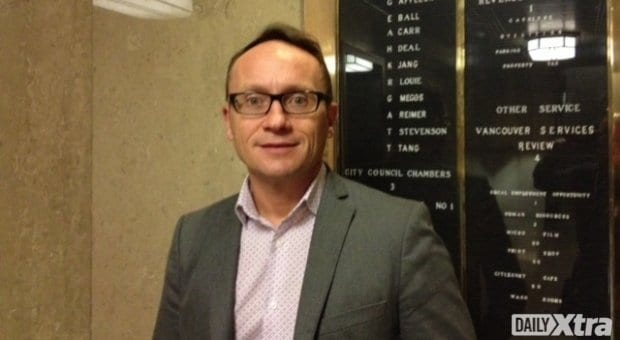The city planners’ new draft of the West End community plan recognizes the importance of the Davie Village and promises to “strengthen it as the heart of the LGBTQ community.”
“We heard that the Davie Village is very important to the broader LGBTQ community, even beyond the West End,” says city planner Kevin McNaney, whose department released the draft Oct 22.
“We also heard that businesses want to see improvements to the aging and tired streetscape as a way to help breathe new life into the area,” he notes.
“The West End plan identifies and strengthens the Davie Village as a culturally and historically important centre for the LGBTQ community,” McNaney says.
“The plan will set in place a framework for improvements to the Village as a way to strengthen it as the heart of the LGBTQ community nightlife and social infrastructure.”
The 120-page draft outlines future plans for all the West End areas, including land usage, zoning, infrastructure, transportation, housing, street beautification and affordability.
The Robson area will be strengthened as the retail, restaurant and “regional shopping and entertainment district,” the draft plan says, while Denman Street will be enhanced as a “main street” of the West End.
The Davie Village will be promoted as “an area for local business and nightlife.” The plan suggests improving and widening sidewalks in the Village; creating more opportunities for outdoor patios, rooftop patios and decorative lighting; improving the “Heart of Davie” plaza; encouraging public art; and finding a new home for BC’s queer resource centre, Qmunity.
The plan, which lists Qmunity under its section on public benefit strategies, estimates $18 to $20 million over 30 years to be allocated to social facilities such as Qmunity and Gordon Neighbourhood House. Both facilities are considered priorities within a 10-year timeframe.
Of the estimated $20 million allocated, $1.5 million will come from the city, $11 million from developer contributions and $5.5 to $7.5 million from partnership contributions.
“That $18 to $20 million sounds like a great start to me,” says Dara Parker, Qmunity’s executive director.
Parker says she is “thrilled” and “delighted” that Qmunity has been publicly recognized under the plan’s public-benefits strategy.
“This is something that we’ve been advocating for, for a long time,” she says.
Asked if the city has told her how much of the money will go to Qmunity, Parker says they haven’t discussed it yet. “We’re talking to them to clarify what it is,” she says.
“We want to know what expectations and implications the private contributions entail,” she says. “We’re not clear on what that means, and we are talking to the city about that.”
“Qmunity is identified as a priority public benefit in the plan for a purpose-built facility in the Davie Village,” McNaney confirms.
“The public benefits strategy identifies community amenity contributions from new development arising from the plan to support the costs of land and a new facility,” he explains. “The city will need to work closely with Qmunity on the space required for the new facility and seek potential sites before exact costs can be determined.”
Several recommendations from the City of Vancouver’s LGBTQ advisory committee’s “Davie Street Revitalization Report” also made it into the new community plan, McNaney notes, such as support for celebrations and enhancements to the Davie plaza.
A streetscape diagram in the draft plan features rooftop patios, public seating space and a rainbow canopy hovering over the heart of the gay village at the Davie and Bute streets intersection.
“It’s what we’ve wanted,” says Dean Malone, who sits on the LGBTQ advisory committee and helped draft the “Davie Street Revitalization Report.”
The advisory committee was one of many community groups and individuals consulted during the 20-month planning process.
“Some people have said that the city is not listening; they’re listening to us,” Malone says.
Malone says he is happy with the level of LGBT inclusion in the plan and honoured to have been a part of the process.
“When you participate in the process and your participation is not only heard but delivered upon, it makes you realize that it’s really worth it to get involved,” he says.
“I’m excited about the implementation planning,” he adds.
If city council approves the plan in November, implementation will begin in early 2014 and will continue through partnerships with local residents, businesses, non-profit groups and the city, McNaney says.
“We need to work on revitalization of the villages, which will entail working with the [business improvement associations] and local residents to determine potential street, patio and sidewalk improvements,” he says.
“We still have time to plan and tweak and make this [vision] more robust,” Malone says. “But this sets the directions. This says that the queer communities matter in the Davie Village. This signals that we matter.”
The draft plan will be presented to council for approval on Nov 20.
Read the city’s draft plan for the West End.

 Why you can trust Xtra
Why you can trust Xtra


